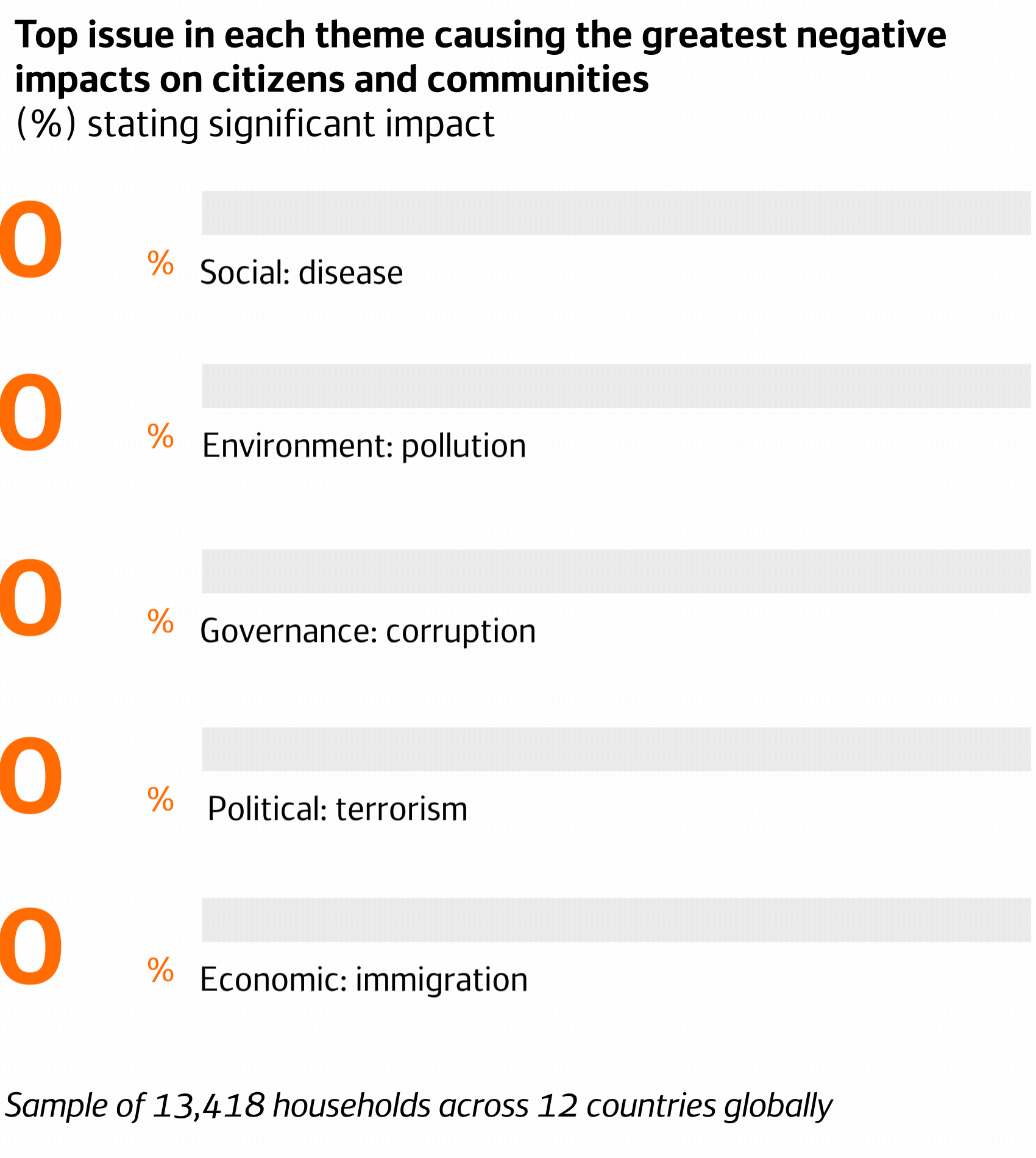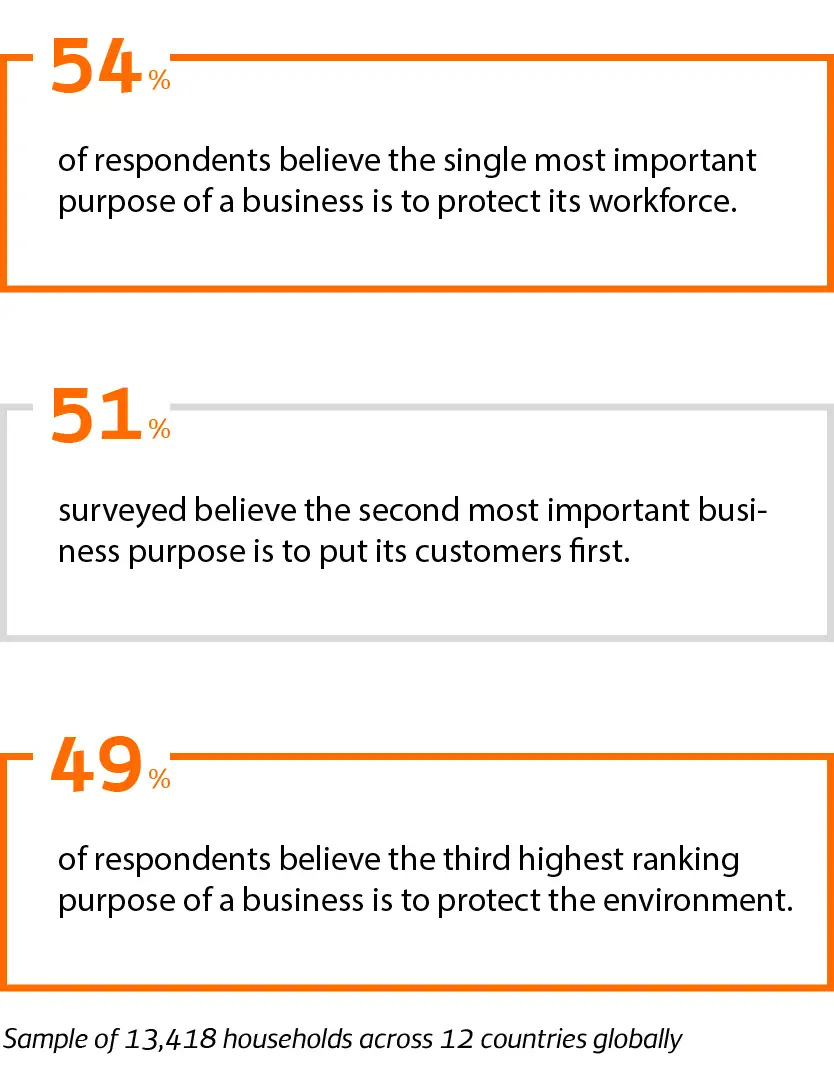Overview
Understanding the political direction of travel at a country level is increasingly significant for businesses operating across international borders. The business landscape differs greatly from one country to another. However, there is one factor which is common to most major global markets: the business landscape almost everywhere is increasingly driven by political risks.
This report demonstrates how salient macro-political issues are among grassroots communities, providing businesses and their insurers with a clear understanding of emerging risk to enable long-term sustainable operations.
"Businesses can pay a high price - financially and reputationally - when they mis-judge the social and political landscape within which they operate."
Barometer risk factors
Working with our research partner Cicero/amo we have undertaken consumer surveys in 12 countries across the global economy. This survey data has been used to create the Kennedys business risk barometer, showing how the political landscape differs in each country. The barometer provides a heat map of a basket of risks currently facing communities around the world.
The business risk barometer - global view
Percentage scores based on the number of people in each country who believe the factor is having a ‘significant negative impact’ on them and their community. Sample of 13,418 households across 12 countries globally.

The key risk factors
Globally, the hot issues causing the greatest negative impacts on citizens and communities represent a spread of social, environmental and governance factors:
- Disease (54%) (post-pandemic)
- Pollution (52%)
- Corruption (52%)
Political risk factors generally rank lower, though the negative impacts of terrorism (41%) are widely felt with several countries recording high-risk scores (above 50%).
Economic factors such as free trade (12%), immigration (18%) and technological innovation (9%) all rank as low political risks in terms of their negative impact on communities.

Concerns around the impacts of disease rank as the greatest global concern (54%). This is likely to have been strongly influenced by the ongoing effects of the global pandemic.
The next biggest risks relate to pollution (52%) and climate change (38%). Businesses are seen as having a strong role to play in mitigating these risks with environmental protection emerging as the third most pressing business purpose, after protecting employees and customers.
Governance issues create particular problems for international businesses as it can be difficult to operate in some countries without being exposed to corruption or organised crime. Navigating these risks requires companies to invest more heavily in legal risk departments and to adopt strong governance frameworks which need to be embedded in local markets.
Political risks are on the rise as civil unrest becomes more commonplace globally. The terms ‘civil unrest’ and ‘terrorism’ are themselves problematic. One person’s definition of civil unrest could be defined by another as an act of terrorism. This can have a knock-on effect on corporates seeking to claim on insurance policies.
Economic liberalisation has given rise to several anti-globalisation movements. Much of the recent political instability has been fuelled to some extent by a grassroots backlash against globalisation, free trade, immigration, and automation. However, our barometer findings show that economic liberalisation is having far less of a negative impact on communities compared to other issues such as public health, poverty, and environmental factors.
Corporate purpose and impact
What do citizen and communities expect from businesses?
Making money is a pre-requisite in running a financially sound business. But among our global respondents, maximising profits only ranks as the fourth most important business purpose as viewed by 48% globally.
Public trust: who will deliver change?
While citizens may place new expectations on businesses to behave in a certain way, it is also clear that they place little trust in businesses as agents to deliver social and environmental progress.
What demands do people place on businesses?
We provided our respondents with a long list of environmental, social and governance issues where responsible companies could potentially play a stronger role.
Top three citizen demands
According to our global research findings, the single most important purpose of a business is to protect its workforce (54% of respondents).
Worker exploitation and modern slavery are becoming bigger political concerns, prompting fresh legislation in many countries. Actions to address these will force all businesses to re-evaluate their supply chain management and insist on ethical trading conditions and minimum labour standards.
The second most important business purpose is to put its customers first (51% of respondents).
Failing to manage customer relationships can be a costly business mistake. Businesses can lose their reputation, business revenues, and face regulatory enforcement behaviour and fines. This is particularly true when failing to properly manage a client’s personal data.
The third highest ranking purpose of a business is to protect the environment (49% of respondents).
We are likely to see increased focus on environmental protection standards, as well as increased environmental liabilities and enforcement actions on businesses which pollute the environment.
Key focus areas - what people around the world would like to see companies in their country do more to promote.

The activist citizen
How citizen power could impact on business operations:
Our survey reveals a wide range of community-led demands placed on businesses. Citizens and civil society groups have found a growing range of means to make their voices heard in corporate boardrooms.
- Cyber-attacks: 26% would join organized online protest groups
- Money talks: 37% would boycott a company’s products
- Investor power: 21% would consider shareholder activism

 Healthcare
Healthcare
 Insurance and reinsurance
Insurance and reinsurance
 Shipping and international trade
Shipping and international trade
 Chile
Chile
 France
France
 Ireland
Ireland
 Singapore
Singapore
 United Kingdom
United Kingdom
 United States
United States
 Israel
Israel